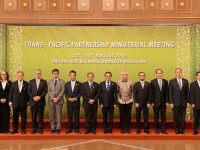The Trans Pacific Partnership (TPP), a proposed trade agreement that encompasses nearly 40 per cent of world GDP, heads to Hawaii later this month for ministerial-level negotiations. According to media reports, this may be the final round of talks, with countries expected to address the remaining contentious issues with their “best offers” in the hope that an agreement can be reached. Canadian coverage of the TPP has centred primarily on U.S. demands for changes to longstanding agricultural market safeguards.
With a national election a few months away, my weekly technology law column (Toronto Star version, homepage version) notes the prospect of overhauling some of Canada’s biggest business sectors has politicians from all parties waffling on the agreement. Canadian International Trade Minister Ed Fast, who will lead the Canadian delegation, maintains that the government has not agreed to dismantle supply management protections and that it will only enter into an agreement if the deal is in the best interests of the country. The opposition parties are similarly hesitant to stake out positions on key issues, noting that they cannot judge the TPP until it is concluded and publicly released.
While the agricultural issues may dominate debate, it is only one unresolved issue of many. Indeed, the concerns associated with the agreement go far beyond the supply of products such as milk and chickens.
Read more ›









